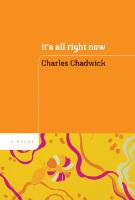Charles Chadwick, It's All Right Now
 Is it possible to sustain for almost 700 pages the conceit that one is not writing a novel but merely recording impressions from an ordinary, unremarkable existence? Charles Chadwick nearly pulls it off. In four sections set during the early 1970s, the mid-1980s, the early 1990s, and the turn of the millennium, and purportedly written some time after each group of events has occurred, the narrator Tom Ripple gives an account of his life with no clear goal in mind, it seems, other than to pass the time, first at work and then during a protracted retirement. Marriage, children, television, neighbors, job, divorce, relocation, dating, parties, friendships, pastimes, church, shopping, illness, death, plus reflections on religion, history, music, philosophy—all are covered in great variety and detail, with little to link them besides mere chronology. As the years go by, Tom attempts halfheartedly to gain some perspective on his experiences, and it is this that Chadwick uses to give the book its shape and tone: often poignant, sometimes downright mournful, tinged with hopefulness, but ultimately inconclusive about what Tom's life means to him.
Is it possible to sustain for almost 700 pages the conceit that one is not writing a novel but merely recording impressions from an ordinary, unremarkable existence? Charles Chadwick nearly pulls it off. In four sections set during the early 1970s, the mid-1980s, the early 1990s, and the turn of the millennium, and purportedly written some time after each group of events has occurred, the narrator Tom Ripple gives an account of his life with no clear goal in mind, it seems, other than to pass the time, first at work and then during a protracted retirement. Marriage, children, television, neighbors, job, divorce, relocation, dating, parties, friendships, pastimes, church, shopping, illness, death, plus reflections on religion, history, music, philosophy—all are covered in great variety and detail, with little to link them besides mere chronology. As the years go by, Tom attempts halfheartedly to gain some perspective on his experiences, and it is this that Chadwick uses to give the book its shape and tone: often poignant, sometimes downright mournful, tinged with hopefulness, but ultimately inconclusive about what Tom's life means to him.It was this inconclusiveness that, however faithful to reality, made It's All Right Now ring kind of hollow for me. To be told after so many pages only that it is extremely difficult, if not impossible, to discern meaning in the passing of time seems finally to be a way of dodging one of the highest callings of which art is capable. True, the patterns we find in our lives are usually manufactured—stories we tell ourselves to get through the days and years—but in a novel such a lack of ambition feels impoverished, even perversely defeatist. Tom Ripple learns to take comfort where he can find it (in music, nature, and other people), and so did I as a reader of Chadwick's book, which contains many, many passages of lovely writing. But I finished it still yearning for a kind of enlightenment that Chadwick seems to think is unattainable in a work of contemporary fiction.
Technorati Tags: Books, Fiction, Charles Chadwick







0 Comments:
Post a Comment
<< Home